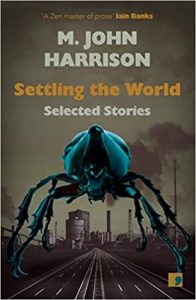Gary K. Wolfe Reviews Settling the World: Selected Stories 1970-2020 by M. John Harrison
 Settling the World: Selected Stories 1970-2020, M. John Harrison (Comma Press 978-1912697281, £9.99, 288pp, tp) August 2020.
Settling the World: Selected Stories 1970-2020, M. John Harrison (Comma Press 978-1912697281, £9.99, 288pp, tp) August 2020.
Harrison’s acute and sometimes merciless fascination with couples who don’t quite know what they’re doing also shows up in two of the most memorable stories in Settling the World: Selected Stories 1969-2019, his first real retrospective collection since Things That Never Happen back in 2003. “The Gift” describes the parallel stories of Sophia, born with a map-shaped birthmark, who entertains men in her lonely hotel room, and Peter Ebert, whose life seems oddly possessed by a tattered paperback book given him by a stranger; eventually their unrelated obsessions bring them together. In “Science and the Arts”, which Harrison once described as “probably the best thing I’ll ever write,” a damaged and depressed artist asks her novelist friend (who has written a novel that sounds a lot like Harrison’s own Signs of Life) to explain quantum indeterminacy so that she can incorporate it into her work. “As science it is speculative. As a metaphor quite nice,” he tells her, at the same time revealing how science often works in Harrison’s short fiction. The delicate dance that finally brings together people on such different wavelengths, though, makes for a moving and lovely story.
Readers familiar with Harrison’s stories know better than to expect anything resembling traditional SF or fantasy, at least not the sort of deeply revisionist space opera of his Kefahuchi Tract series. Instead, we see in the oldest stories here echoes of the Ballardian preoccupation with “inner space” and narrative experimentation (a couple of them actually date back to the Moorcock-edited New Worlds Quarterly of the 1970s). Nearly all focus more on Harrison’s characteristically discombobulated characters than on the huge events surrounding them. “The Causeway” may come closest to traditional SF, describing an artificial ocean causeway on an alien planet, thousands of kilometers long and apparently linking continents. For the locals it’s the site of a ritual pilgrimage, but the point of view is that of an unwelcome spaceman who ends up wreaking havoc. “The Machine in Shaft Ten” turns out to be a mysterious mechanism at the Earth’s core that converts all human emotion to energy, revealing that “we have been used, that our most public triumphs and our most personal tragedies may be the oil that runs the galactic bakery van.” Such a taste for cosmic absurdity here lands Harrison in an odd space between Douglas Adams and Samuel Beckett, and it recurs in “Settling the World”, in which God, having been discovered on the far side of the moon and towed to Earth, constructs a giant motorway from the Thames to the Midlands and begins transporting segments of an enormous human figure, apparently for later assembly. The story, though, doesn’t focus on resolving the mystery (though we do get a satisfyingly absurd vision of God), but on exploring the conflicting motives and ambitions of a couple of would-be rebels and liberators. An alien invasion of some sort features in “The Crisis”, except that the invaders, the iGhetti, are described as resembling fleshy stalks of rhubarb that “had leaked into our world from the astral plane,” though rumors ascribe their origin as everything from the internet to a banking crisis. While the iGhetti establish a square mile zone in London apparently immune from the travails of the outside world, this is all largely background to the stressful relationships of Balker, his homeless friend Alan, and the unnamed second-person narrator (in one of the more evocative uses of second-person viewpoint I’ve seen).
“A Young Man’s Journey to Viriconium” might sound like one of Harrison’s celebrated Viriconium tales, but in fact it was also published (in Things That Never Happen) as “A Young Man’s Journey to London”, and Viriconium only shows up as something visible through a mirror in a London pub, though some characters claim to have gone there. Harrison’s other iconic setting, Autotelia, is mentioned in “The East”, in which the narrator, who claims to be a conjurer, meets an old man in Soho who claims to be a refugee from somewhere in “the East”; in its rather heartbreaking depiction of a search for a place in the world, it’s thematically of a piece with the Viriconium tale. Harrison’s other familiar theme, rock climbing, features in “Running Down”, focused largely on the Gothic desperation of a rootless figure named Lyall, but ending with a sort of geological/psychic upheaval, and in “The Ice Monkey”, a comparatively conventional, if moving, tale of a fatal ice-climbing accident. Harrison’s often overlooked but quite mordant sense of humor is evident in stories like “Yummie”, in which a recovering heart patient is haunted by an almost cartoon-like figure with an unnaturally round head, and especially in the hilarious “I Did It”, in which the narrator inadvertently creates a fad of chunking yourself in the face with a hatchet as an expression of disappointment at, say, a favorite sports team losing an important game.
While nearly half the stories here date from prior to 2000, seven were included in Things That Never Happen and three in 2017’s You Should Come With Me Now, including “The Crisis” and “Cicisbeo”, a rather spooky variation on Hawthorne’s “Wakefield”, in which a husband retreats to his attic, where he loses touch with his family as he begins building a strange sort of tunnel into the sky. A couple of the stories have previously been published in limited-edition chapbooks from Nightjar Press, including what might be the finest and most unsettling recent story in the collection, “Doe Lea”. After attending the death of his hospitalized father, the narrator sets out for home, only to have his train stalled by mechanical difficulties near a village where the station signpost reads “Doe Lea.” The train that stops at a possibly phantom or timeslipped town is a trope so familiar even The Twilight Zone used it, but in Harrison’s hands the nearly abandoned village with its oddly needy inhabitants takes on a genuine otherworldly air, and the story fits in especially well with the ghost story variations that made up most of You Should Come With Me Now. But, as with his SFF-related stories or his occasional nods toward horror fiction, a ghost story is never simply a ghost story with Harrison, and the stories are packed with provocative questions and gestures toward some elusive meaning just outside the edges of the tale. Readers looking for nothing more than transparency of plot are inevitably going to be frustrated by Harrison’s finely honed if unconventional narrative techniques, but for the rest of us Settling the World is a brilliant labyrinth of tales by one of modern fiction’s most distinctive voices.
Gary K. Wolfe is Emeritus Professor of Humanities at Roosevelt University and a reviewer for Locus magazine since 1991. His reviews have been collected in Soundings (BSFA Award 2006; Hugo nominee), Bearings (Hugo nominee 2011), and Sightings (2011), and his Evaporating Genres: Essays on Fantastic Literature (Wesleyan) received the Locus Award in 2012. Earlier books include The Known and the Unknown: The Iconography of Science Fiction (Eaton Award, 1981), Harlan Ellison: The Edge of Forever (with Ellen Weil, 2002), and David Lindsay (1982). For the Library of America, he edited American Science Fiction: Nine Classic Novels of the 1950s in 2012, with a similar set for the 1960s forthcoming. He has received the Pilgrim Award from the Science Fiction Research Association, the Distinguished Scholarship Award from the International Association for the Fantastic in the Arts, and a Special World Fantasy Award for criticism. His 24-lecture series How Great Science Fiction Works appeared from The Great Courses in 2016. He has received six Hugo nominations, two for his reviews collections and four for The Coode Street Podcast, which he has co-hosted with Jonathan Strahan for more than 300 episodes. He lives in Chicago.
This review and more like it in the September 2020 issue of Locus.
 While you are here, please take a moment to support Locus with a one-time or recurring donation. We rely on reader donations to keep the magazine and site going, and would like to keep the site paywall free, but WE NEED YOUR FINANCIAL SUPPORT to continue quality coverage of the science fiction and fantasy field.
While you are here, please take a moment to support Locus with a one-time or recurring donation. We rely on reader donations to keep the magazine and site going, and would like to keep the site paywall free, but WE NEED YOUR FINANCIAL SUPPORT to continue quality coverage of the science fiction and fantasy field.
©Locus Magazine. Copyrighted material may not be republished without permission of LSFF.






